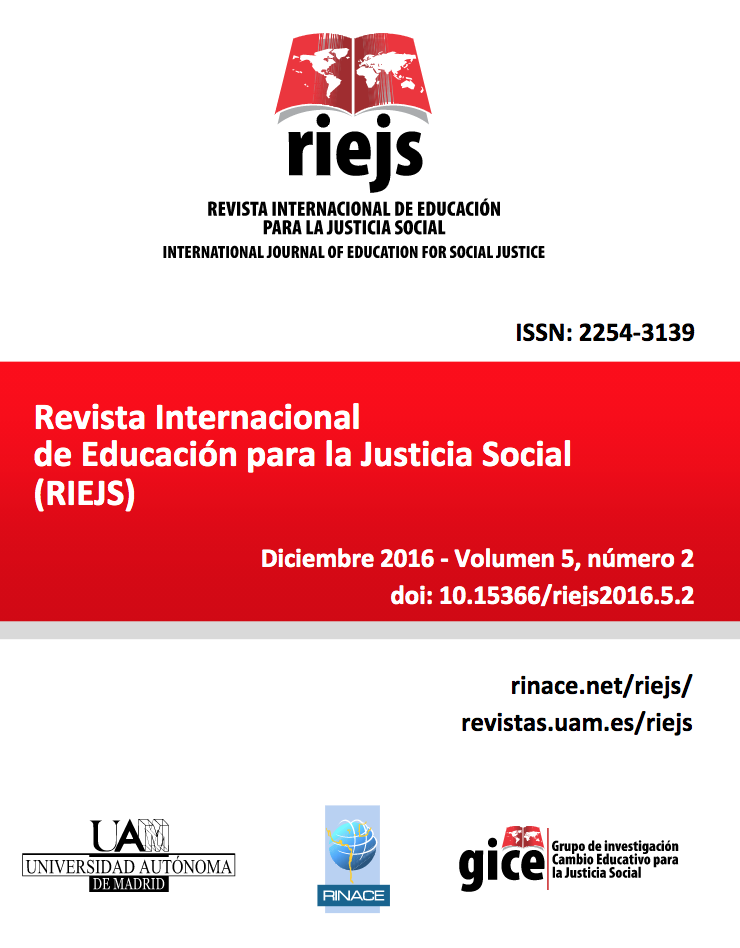Teacher Education and Social Justice in the 21st Century: Two Contested Concepts //Formación del Profesorado y Justicia Social en el Siglo XXI: Dos Conceptos Controvertidos
Keywords:
Teacher education, Social reproduction, Cultural responsiveness, Justice, Equity.Abstract
In 2016, it seems impossible to stipulate that the basic aim of a thoughtful and engaged citizenry for the United States is shared by all. But irrespective of political spectacle, forces of social and cultural reproduction play out in public schools and universities, and often experiences and realities are located and interpreted to privilege an instrumental, quantitative, and some would say narrow construction of the purpose of schooling. This short essay addresses two tropes within education: teacher education (i.e. the ways in which teachers are prepared) and social justice (i.e. one means to an end for such preparation). The current social and political climate in the United States demands that these respective terms stay salient with regard to the needs of children in public schools. Said another way, both social justice and teacher education have become contested concepts. Are they compatible, or is their consonance an educational chimera?Downloads
References
Agarwal, R., Epstein, S., Oppenheim, R., Oyler, C., & Sonu, D. (2010). From ideal to practice and back again: Beginning teachers teaching for social justice. Journal of Teacher Education, 61(3), 237-247. doi:10.1177/0022487109354521
Conklin, H. G. & Hughes, H. E. (2016). Practices of compassionate, critical, justice-oriented teacher education. Journal of Teacher Education, 67(1), 47-60. doi:10.1177/0022487115607346
Delpit. L. (1988). The silenced dialogue: Power and pedagogy in educating other people’s children. Harvard Educational Review, 58(3), 280-299. doi:10.17763/haer.58.3.c43481778r528qw4
Gallie, W. B. (1956). Essentially contested concepts. Proceedings of the Aristotelian Society, 56, 167-198. doi:10.1093/aristotelian/56.1.167
Greene, M. (1978). Landscapes of learning. New York: Teachers College Press.
Keiser, D. L. (2005). Learners not widgets: Teacher education for social justice during transformative times. En N. M. Michelli y D. L. Keiser (Eds.), Teacher education for democracy and social justice (pp. 31-56). New York: Routledge Falmer.
Keiser, D. L. (2005). The right to be equally taught: Three sites of inquiry for social justice at a diverse high school. En N. M. Michelli y D. L. Keiser (Eds.), Teacher education for democracy and social justice (pp. 149-166). New York: Routledge Falmer.
McDonald, M. (2007). The joint enterprise of social justice teacher education. Teachers College Record, 109(8), 2047-2081.
Michelli, N. M. & Keiser, D. L. (2005). Teacher education for democracy and social justice. New York: Routledge Falmer.
Parker, W. C. (2006). Pledging allegiance. Phi Delta Kappan, 87(8), 613-613. doi:10.1177/00317217608700818
Tyack, D. B. (2003). Seeking common ground: Public schools in a diverse society. Cambridge, MA: Harvard University Press.
